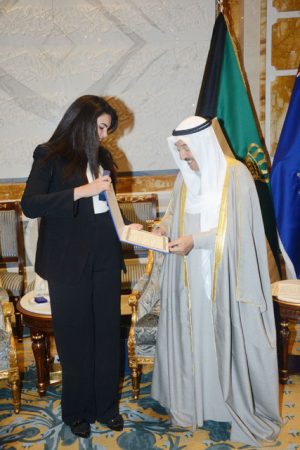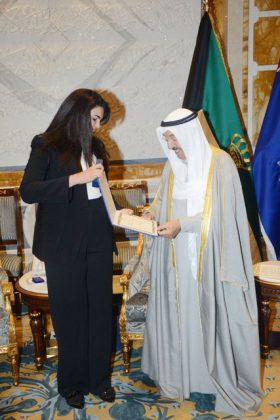British Broadcasting Corporation (BBC) chose Kuwaiti political activist Dr. Al Anoud Al-Sharikh as one of the top 100 influential women around the world for 2019. Al-Sharikh was among 17 Arab women in the list, chosen in recognition of their efforts and achievements in sports, business, art, medicine, architecture and other fields, the BBC said on Thursday. Al-Sharikh was chosen in appreciation of her work with international organizations to promote gender equality, as well as being the first Kuwaiti woman to receive the French National Order of Merit for defending women rights.
In a statement to local media, Al-Sharikh expressed her joy over being chosen in the list, noting that she is the first Kuwaiti to be among the 100 influential women. She added that she has executed programs on changing society’s view on working women in the Arab and Muslim World, in cooperation with international organizations.
Kuwaiti women had overcome many challenges in the past decades by their strong will and determination, said Al-Sharikh, noting that enabling women to become leaders is part of the Kuwait Vision 2035. Dr. Al-Anoud received her Bachelor’s degree from King’s College London, while her Masters and PhD degrees came from School of Oriental and African Studies (SOAS).
When I was younger, I used to participate in gender-focused discussions with very little understanding on the issue. I noticed cultural discrepancies and felt that I was in a position to comment on them within my social groups.
As I delved deeper into these discussions, I found myself facing a lot of resistance and in some moments, ridicule, simply because I was championing equality and respect for all women. I decided to educate myself on the subject and read the works of several notable researchers. As I immersed myself in this realm, I felt readier than ever to throw myself back into these conversations. I tried again, I was a changed woman with an educated perspective. Alas, my environment remained largely the same.
Here we are today, and I am finally having a proper gender-themed conversation with one of Kuwait’s leading experts on the issue, Dr. Alanoud Alsharekh. I asked Alanoud about how her interests shaped her career goals. “Essentially, my academic findings became a way to solidify my activist interests, which were in human rights and women’s rights. It became a cycle that kept feeding into each other and as geopolitical issues change and feed into these subjects my interests would follow them.”
Alanoud is a consultant researcher who works on sociopolitical, cultural and security issues in the Arabian Gulf region. She founded her consultancy firm ‘Ibtkar’ which offers a variety of services including strategy solutions, corporate training and conference convening.
I was curious on Alanoud’s perspective on key challenges that women are facing in this region, given her extensive research and corporate experience. “Whether in Kuwait or in the Arab region, women are treated as incomplete citizens in terms of their rights. This creates injustice from a human rights perspective and creates challenges in terms of equal opportunity in jobs, marriage choices, protection from violence and leadership opportunities.”
I was a bit overwhelmed by the term ‘incomplete citizens’ but Alanoud went on to explain that “gender equality is just one form of equality that we need to look at. We need to look at finding equal opportunities for young people. If young people or women or people from a certain socioeconomic background are only allowed to engage in the labor market in entry level positions this is going to create huge problems for us in the future. The aspirational underpinnings of any education or any form of ambition is upward social and economic mobility, and if there is a ceiling on that then you have frustration, anti-establishment movements, and economic and cultural regression. I strongly believe in gender equality in terms of legal rights and in terms of opportunities, and that cannot happen while the mechanisms that disempower women continue to flourish. In Kuwait we do not have working shelters, or hotlines or resources for victims of violence, how can we talk about advancement when there is no domestic violence law? Something has to be done about this first and foremost.”
Alanoud’s rationale is certainly well-founded, particularly in light of recent global movements that served as watershed moments to break the silence on harassment and inequality. I asked Alanoud about her perspective on these movements (#MeToo and #TimesUp) and their implications on our cultural understanding of gender. “They have translated into # اناكمان and #mosquemetoo but they did not get the same traction. After these hashtags there have been more discussions of harassment on traditional media like radio stations. Maybe the effects won’t be immediate but civil action can lead to policy change.”
Nonetheless, Alanoud is an active participant in global efforts towards the realization of gender equality. She is committed to support the United Nations Sustainable Development Goals through her work as a consultant. “My consultancy Ibtkar has been training 15 women to become future political leaders in keeping with Kuwait Vision 2035 and the Sustainable Development Goals of empowering women. It’s important that we equip women with the soft skills and the practical tools they need to get over the many social, political and financial obstacles that deter them from fulfilling their full potential.”
When I recall my earlier conversations about gender equality, a common response I used to hear was that Kuwaiti women ‘have it all’.
I remember feeling grateful for the opportunities I had, but I knew for a fact that Kuwaiti women having it all was an untrue notion, did Alanoud agree with me? How did she respond when others told her Kuwaiti women have it all? “I speak to them in facts. I share my knowledge from almost four years in the field of helping survivors of gender-based violence. I tell them about bloody faces, stolen futures and the indignity of being refused housing because of your sex, even when you can afford rent. These discriminatory practices are a sad reality and the idea that women anywhere ‘have it all’ after centuries of gendered tyranny is a fallacy.”
There’s no denying Alanoud’s passion and commitment towards her work and values. I can only hope that others reading this will share her beliefs and perseverance towards a brighter, fairer and more just future for all women. “I encourage everyone to support this cause. I encourage everyone to volunteer, to advocate, to become a force of good because there is so much left to do and it is unrealistic and unfair to expect the government to do it all. As women we need to learn to lobby our legislators collectively and to force them into action.”
By Nourah Al-Oseimi
Exclusive to The Times Kuwait
To learn more about Alanoud Alsharekh’s consultancy firm, please visit @ibtkar_consult on Instagram or visit the following website www.ibtkar.com
Nourah Al-Oseimi is a 25-year-old Kuwaiti who holds a Master’s degree in Business Administration. Nourah has worked in different places such as the Central Bank of Kuwait and the United Nations. She serves as a free-lance contributing writer to the Times Kuwait – Newsmagazine. Her column – Essentially Kuwaiti – will feature an in-depth look on exceptional young Kuwaitis and their efforts towards the realization of a New Kuwait.
























